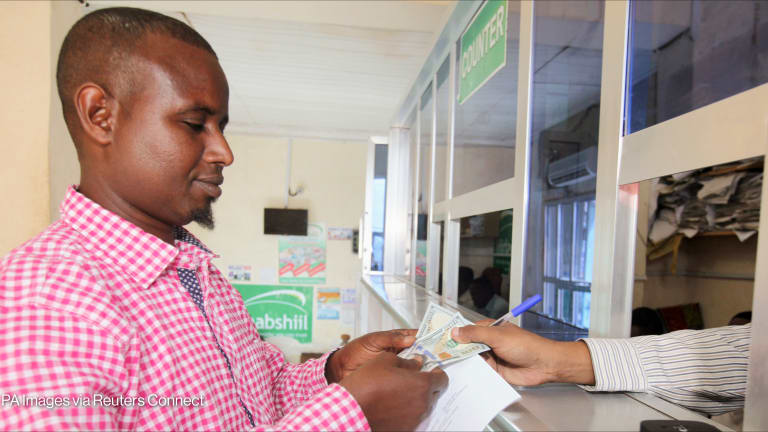Philanthropists drum up UNICEF funds as COVID-19 enters 'endemic' stage
Working with UNICEF, a group of philanthropists urges peers to give more to help children worldwide face the COVID-19 endemic.
Philanthropists who supported UNICEF during the COVID-19 pandemic are asking their peers to provide funding for the organization’s children’s health programs worldwide as the virus enters the endemic stage. UNICEF’s International Council, which includes more than 135 philanthropists and partners, is amplifying the organization’s call for more philanthropic funding for health and education systems that experienced setbacks during the pandemic. Service gaps exposed during the pandemic still need to be addressed. These include a lack of adequate medical supplies or trained personnel at some facilities and the great distances between vulnerable populations and health facilities, according to UNICEF, which provides humanitarian and development aid to children worldwide. And issues that have emerged in the aftermath of COVID-19, such as the mental health toll of lockdowns on young people, also are in need of urgent attention, said Kaia Miller Goldstein, a UNICEF International Council member. “We’re not done with COVID,” she told Devex. “We don’t know what the repercussions are going to be. We’re watching that.” A goal of the council is to encourage donors to give more to UNICEF, which relies entirely on voluntary contributions from philanthropists and governments. Together, UNICEF and philanthropists raised approximately $218 million in 2021 during the height of the pandemic, when UNICEF partnered with COVAX to procure and deliver COVID-19 vaccine doses to low- and middle-income countries. Goldstein, who has been a council member since its 2017 inception, is an economic development consultant who has advised leaders in low- and middle-income countries, as well as a senior associate at the Harvard Institute for Strategy and Competitiveness. She also runs a family foundation with her husband Jonathan Goldstein and sees philanthropy as key to meeting global development goals. Council members also include notables such as Emirati billionaire businessman and politician Abdul Aziz Al Ghurair, Slack co-founder Stewart Butterfield, and Finnish social entrepreneur Maria Ahlström-Bondestam, who chairs the panel. In terms of their own giving, members have provided $510 million since 2017. Last year, they donated more than $85 million, UNICEF told Devex. The organization’s total revenue for 2022 was $10.3 billion. Revenue represents funds pledged to UNICEF during a year, regardless of when the funds will be transferred to it, a spokesperson said. The group’s fundraising efforts have been critical to UNICEF’s ongoing efforts to fill health care gaps and contribute to achieving the Sustainable Development Goals, said Kieran O’Brien, chief of global philanthropy within UNICEF’s private fundraising and partnerships division. While the International Council doesn’t have a specific fundraising goal this year, in terms of numbers, “growth is the goal,” O’Brien said in an interview with Devex. Private philanthropy is critical to strengthening existing health systems and bolstering resources available in the many locations where UNICEF works, he said. In India, for instance, the money is helping to train workers at early childhood centers — where health services such as immunizations and nutrition delivery already were being provided — so that they also can monitor children’s growth and flag when they miss milestones, he said. “That system was set up by UNICEF but privately funded,” he said. “And that appeals to private philanthropists, the idea that they can fill a gap.” The “beauty” of private philanthropy is its speed and agility when it comes to addressing urgent needs and making funding decisions that, within governments, would be slowed by bureaucratic processes, Goldstein added. “The role of the private sector and the role of private philanthropy is untapped, in my opinion,” she said. “Even within UNICEF, our funding is faster, it’s more flexible when you have to turn on a dime, like if there is a COVID-19 pandemic.” Donors can motivate each other in a way that UNICEF can’t and often the council appeals to potential funders' business sensibilities, Goldstein said. “To me, UNICEF is like a venture capital fund,” she added. “We put our money in and we’re not experts in the communities, the local-based community organizations that [UNICEF is] finding in these developing countries. They know that. I’m investing in the fund, and I want the fund to report back to me that the communities are stronger, that children are thriving.” Update, Oct. 20, 2023: This article has been updated with additional information on UNICEF’s budget.
Philanthropists who supported UNICEF during the COVID-19 pandemic are asking their peers to provide funding for the organization’s children’s health programs worldwide as the virus enters the endemic stage.
UNICEF’s International Council, which includes more than 135 philanthropists and partners, is amplifying the organization’s call for more philanthropic funding for health and education systems that experienced setbacks during the pandemic.
Service gaps exposed during the pandemic still need to be addressed. These include a lack of adequate medical supplies or trained personnel at some facilities and the great distances between vulnerable populations and health facilities, according to UNICEF, which provides humanitarian and development aid to children worldwide.
This article is free to read - just register or sign in
Access news, newsletters, events and more.
Join usSign inPrinting articles to share with others is a breach of our terms and conditions and copyright policy. Please use the sharing options on the left side of the article. Devex Pro members may share up to 10 articles per month using the Pro share tool ( ).
Stephanie Beasley is a Senior Reporter at Devex, where she covers global philanthropy with a focus on regulations and policy. She is an alumna of the UC Berkeley Graduate School of Journalism and Oberlin College and has a background in Latin American studies. She previously covered transportation security at POLITICO.








